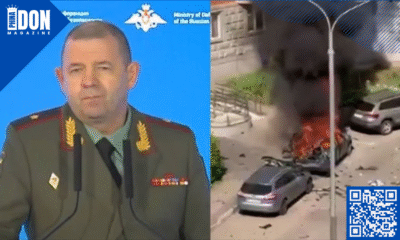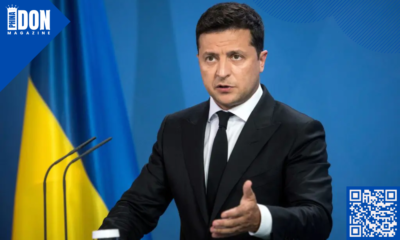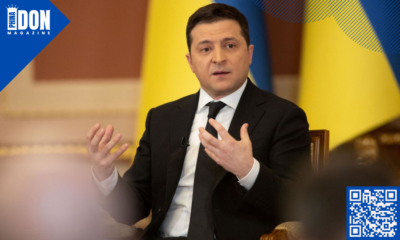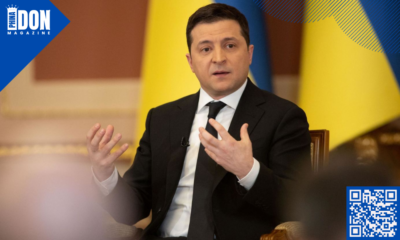Foreign
FSB Claims Thwarted Assassination Plot Linked to Ukraine.

On Saturday, Russia’s Federal Security Service (FSB) announced it successfully disrupted a purported assassination attempt targeting a high-ranking Russian military officer and a pro-Russian war blogger. The alleged plot involved a bomb concealed within a portable music speaker, a tactic that highlights the sophisticated means reportedly employed by involved parties.
The FSB conveyed that a Russian national had made contact with a representative from Ukraine’s military intelligence via the messaging platform Telegram. Acting on directives from this Ukrainian intelligence officer, the Russian citizen procured an explosive device from a stash located in Moscow. The bomb, as described by the FSB, was constructed with ball bearings to enhance its lethality.
Significantly, the FSB did not disclose the identities of the intended victims, sparking curiosity regarding the motivations and implications of the purported assassination attempt. In response to these developments, Ukraine has underscored its stance that the ongoing conflict with Russia presents an existential threat to its sovereignty. Ukrainian authorities have indicated that targeted killings are deemed a legitimate strategy to undermine morale among adversaries and hold individuals accountable for perceived war crimes.
In contrast, Russia has denounced such actions, labeling them as acts of terrorism and pointing to past incidents, such as the assassination of Darya Dugina, to illustrate its position on the conduct of Ukrainian forces. This unfolding narrative underscores the heightened tensions and complexities surrounding the ongoing conflict between Russia and Ukraine, raising questions about legality, ethics, and the broader implications for both nations.
Foreign
Niger to Nationalize Uranium Mine Amidst Shifting Alliances.

Niger has announced plans to nationalize the Somair uranium mine, currently operated by French nuclear firm Orano. This decision marks a further departure from France, Niger’s former colonial power, and a potential realignment with Russia. The military government, in power since a 2023 coup, accuses Orano of unfairly benefiting from the mine’s output since its launch in 1971. Orano, which holds a 63% stake in Somair, disputes the allegations and has threatened legal action, citing a “systematic policy of stripping mining assets.” This move follows Niger’s earlier removal of Orano’s operational control over key mines in the country. The nationalization reflects a broader trend in West Africa, with Mali and Burkina Faso also pursuing similar policies under military rule. The situation is further complicated by existing arbitration processes between Orano and Niger, including a recent lawsuit filed by Orano.
Foreign
Nigeria’s Chief Of Naval Staff Working Visit To Denmark.

On Monday 16 June 2025, the Nigeria Chief of the Naval Staff (CNS), Vice Admiral Emmanuel Ikechukwu Ogalla (Admiralty Medal) commenced a 3-day working visit to Denmark. The working visit which is at the instance of the Danish Navy aims to strengthen cooperation between both navies.
The visit saw the CNS take a short boat trip with the Admiral of the Danish Navy, Rear Admiral Søren Kjeldsen. In the company of the CNS was Ambassador T. A. Elias-Fatile, CDAai/Head of Mission, Embassy of Nigeria, in Sweden and the Nordic countries, the Navy Secretary, Rear Admiral Patrick Nwatu and Nigeria’s Defence Adviser to London, Brigadier General Manu.
Other engagements on the first day of the working visit was a meeting with the CEO of Blue Denmark and a discussion session with the Denmark Ministry of Defence’s Centre for Security and Operations.
Below are some pictures that was taken :


Foreign
Silento Sentenced to 30 Years for Murder.

Atlanta-based rapper Silento, known for his viral hit “Watch Me (Whip/Nae Nae),” has been sentenced to 30 years in prison after pleading guilty to charges of aggravated assault and possession of a firearm. The sentencing follows his confession to fatally shooting his cousin, Frederick Rooks III, in January 2021.
DeKalb County Police discovered Rooks with multiple gunshot wounds. Investigations revealed that Silento and Rooks were last seen together in a white BMW SUV, which was later captured on security footage fleeing the scene after the shooting.
Prior to the incident, Silento’s PR manager, Chanel Hudson, stated that the rapper had been struggling with mental health issues for several years. In 2020, he was also charged with assault for allegedly attacking two people with a hatchet. Silento himself acknowledged his struggles with mental health in a 2019 interview, stating, “I have been fighting demons my whole life.”






















